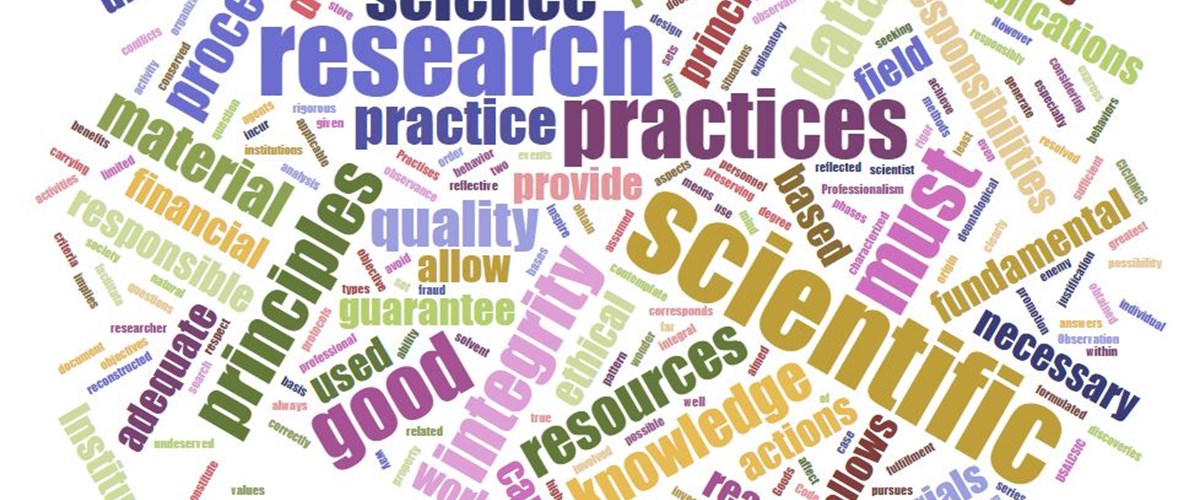Scientific Integrity and Good Practises

 |
Scientific Integrity and Goods Practises |
Integridad científica y Buenas practicas |
|
Scientific Integrity and Goods Practises
Scientific integrity corresponds to a pattern of behavior in research characterized by the observance and promotion of ethical and deontological principles that inspire and guarantee a rigorous and responsible practice.
Good scientific practices are based on the fundamental principles of integrity in research, affect all aspects related to the process of scientific research and contemplate a set of actions and responsibilities applicable both to institutions and to all agents involved in the research process, the fulfillment of which is aimed at preserving an integral, solvent and quality science.
These principles are as follows:
- Professionalism and professional rigor to guarantee the quality of the research, which will be reflected in its design, methods, analysis and use of resources.
- The principle of scientific knowledge is the ability to wonder or question the why of events or situations not investigated or resolved so far. Science pursues an objective knowledge that can be assumed to be true. To achieve this, it follows a reflective process that has two phases: the methodical doubt and the justification of the explanatory hypothesis.
- Observation and experimentation in the laboratory or in the natural environment are designed to obtain data that provide adequate answers to the scientific questions that are formulated. For this reason, research must be carried out following well-designed work protocols that, if necessary, can be examined and understood by any researcher in the given scientific field.
- In scientific research, data from experiments and observations, and the materials used, are the basis for results and publications. For this reason, it is necessary, in case of doubt, that the experiments can be reconstructed and the bases of their interpretation understood. Bearing in mind that the property of the data is always the Institution in which the work has been carried out, the materials must be conserved or, at the very least, their origin must be clearly documented.
- The Institution must provide researchers and personnel in training with sufficient material means, as well as adequate supports to store the data obtained, in order to allow any expert in the field to understand and reproduce it.
- Material and financial resources must be used effectively and efficiently and managed correctly and responsibly, in such a way that they allow or facilitate the achievement of the planned objectives and thereby generate the highest possible degree of trust in society. This is especially important considering that financial and material resources are limited.
- Science as the search for knowledge, is by principle the enemy of fraud. However, there is the possibility of deviations in the activity of researchers, seeking fame or undeserved merits, or even in some cases, personal or institutional economic benefits. These types of deviations constitute the greatest attack on the proper development of scientific practice, and are the ultimate responsibility of the scientist who practices them.
Good practices are a series of individual and organizational actions and behaviors based on the fundamental values of science, which express the principles and responsibilities that scientific integrity implies. Good scientific practice supports responsible conduct in research.
The Code of Good Scientific Practices is the document that establishes guidelines for action, ethical and quality criteria, and good scientific practices in carrying out research activities within the CIC-IBMCC (USAL-CSIC) and the FICUS, which sets the guidelines to avoid conflicts, not incur in unfair practices or falsify the results and that guarantees respect for the authorship of the publications and the ownership of the discoveries.
This code includes mandatory regulations and will be applicable to all investigations that are carried out totally or partially at the CIC-IBMCC (USAL-CSIC) / FICUS by research personnel linked to it, including visiting personnel, scholarship holders or students who may to be related to said investigations and / or agreements, as well as to the research support staff in the development and management of projects, all of them committing to carry out comprehensive and excellent research.
All researchers must be aware of this code and must ensure that they comply with the principles and recommendations in it. The CIC-IBMCC (USAL-CSIC) / FICUS staff with responsibilities in the management of the investigation must guarantee compliance with these principles and recommendations.
The Center's Management will ensure that research projects meet high quality criteria and adhere to the recommendations contained in this code of good research practices.
Likewise, the CIC-IBMCC (USAL-CSIC) / FICUS adopts, for all its staff, the ethical principles and professional responsibilities related to research activity, contained in the “National Declaration on Scientific Integrity” signed by different institutions in 2015, and the 2016 COSCE proposal on the “Transparency Agreement on the use of animals for scientific experimentation in Spain” as included in the list of entities adhering to said agreement.
Relevant documents:
- National Declaration on Scientific Integrity
- Transparency Agreement on the use of animals for scientific experimentation in Spain
- Code of good scientific practises
Integridad científica y Buenas practicas
La integridad científica corresponde a un patrón de comportamiento en la investigación caracterizado por la observancia y promoción de principios éticos y deontológicos que inspiran y garantizan una praxis rigurosa y responsable.
Las buenas prácticas científicas se basan en los principios fundamentales de la integridad en la investigación, afectan a todos los aspectos relacionados con el proceso de la investigación científica y contemplan un conjunto de acciones y responsabilidades aplicables tanto a las instituciones como a todos los agentes implicados en el proceso de investigación, cuyo cumplimiento va dirigido a preservar una ciencia íntegra, solvente y de calidad.
Estos principios son los siguientes:
- La profesionalidad y el rigor profesional para garantizar la calidad de la investigación, que se reflejará en su diseño, en los métodos, en el análisis y en el uso de los recursos.
- El principio del conocimiento científico es la capacidad de asombro o de interrogación sobre el porqué de hechos o situaciones hasta este momento no investigadas o resueltas. La ciencia persigue un conocimiento objetivo que pueda ser asumido como cierto. Para lograrlo, sigue un proceso reflexivo que tiene dos fases: la duda metódica y la justificación de la hipótesis explicativa.
- La observación y la experimentación en el laboratorio o en el medio natural están destinadas a obtener datos que faciliten las respuestas adecuadas a las preguntas científicas que se formulen. Por esta razón, la investigación debe realizarse siguiendo protocolos de trabajo bien proyectados y que, de ser necesario, puedan ser examinados y comprendidos por cualquier investigador del campo científico determinado.
- En la investigación científica, los datos de experimentos y observaciones, y los materiales utilizados, son la base de los resultados y de las publicaciones. Por esta razón, es necesario, en caso de dudas, que se puedan reconstruir los experimentos y comprender las bases de su interpretación. Teniendo en cuenta que la propiedad de los datos es siempre de la Institución en la que se ha realizado el trabajo, los materiales deben conservarse o cuanto menos, documentarse claramente su origen.
- La Institución debe proporcionar a los investigadores y personal en formación, los suficientes medios materiales, así como los soportes adecuados para almacenar los datos obtenidos, con el fin de permitir a cualquier experto en la materia su comprensión y reproducción.
- Los recursos materiales y económicos deben utilizarse eficaz y eficientemente y administrarse con corrección y responsabilidad, de manera que permitan o faciliten alcanzar los objetivos previstos y generen con ello el mayor grado posible de confianza en la sociedad. Esto es especialmente importante teniendo en cuenta que los recursos económicos y materiales son limitados.
- La ciencia como búsqueda del conocimiento, es por principio, enemiga del fraude. Sin embargo, cabe la posibilidad de desviaciones en la actividad de los investigadores, buscando fama o méritos inmerecidos, o incluso en algún caso, beneficios económicos personales o institucionales. Este tipo de desviaciones, constituyen el mayor atentado al buen desarrollo de la práctica científica, y son responsabilidad última del científico que las practica.
Las buenas prácticas son una serie de acciones y comportamientos individuales y organizacionales basados en los valores fundamentales de la ciencia, que expresan los principios y responsabilidades que implica la integridad científica. Las buenas prácticas científicas apoyan la conducta responsable en la investigación.
El Código de Buenas Prácticas Científicas es el documento en el que se establecen pautas de actuación, los criterios, éticos y de calidad, y las buenas prácticas científicas en la realización de las actividades de investigación en el seno del CIC-IBMCC (USAL-CSIC) y la FICUS, que marca las pautas para evitar conflictos, no incurrir en prácticas desleales o falsear los resultados y que garantice el respeto a la autoría de las publicaciones y la propiedad de los descubrimientos.
Dicho código incluye normativa de obligado cumplimiento y será de aplicación a todas las investigaciones que se desarrollen total o parcialmente en el CIC-IBMCC (USAL-CSIC) / FICUS por personal investigador vinculado a él, incluyendo el personal visitante, becarios o estudiantes que puedan relacionarse con dichas investigaciones y/o acuerdos, así como al personal de apoyo a la investigación en el desarrollo y gestión de proyectos, comprometiéndose todos ellos a llevar a cabo una investigación integra y de excelencia.
Todos los investigadores deben de conocer este código y tienen que asegurar que cumplen con los principios y recomendaciones en el recogido. El personal de CIC-IBMCC (USAL-CSIC) / FICUS con responsabilidades en la gestión de la investigación tiene que garantizar el cumplimento de dichos principios y recomendaciones
Desde la Dirección del centro se velará para que los proyectos de investigación cumplan con altos criterios de calidad y se atengan a las recomendaciones recogidas en este código de buenas prácticas de investigación.
Igualmente, el CIC-IBMCC (USAL-CSIC) / FICUS adopta, para todo su personal, los principios éticos y responsabilidades profesionales relativas a la actividad investigadora, contenidos en la “Declaración Nacional sobre Integridad Científica” suscrita por diferentes instituciones en 2015, y la propuesta de la COSCE de 2016 sobre el “Acuerdo de transparencia sobre el uso de animales de experimentación científica en España” tal y como se recoge en el listado de entidades adheridas a dicho acuerdo.
Documentos relevantes:
- Declaración Nacional sobre Integridad Científica
- Acuerdo de transparencia sobre el uso de animales de experimentación científica en España
- Código de Buenas Prácticas Científicas



